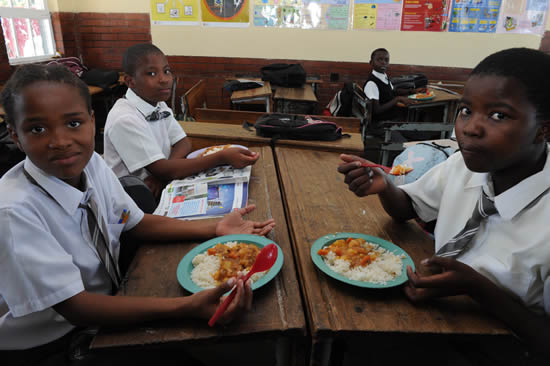Full tummies equal better marks
Full tummies equal better marks lebangThe National School Nutrition Programme feeds millions of children across the country and is paying off.
 More than nine million learners across South African public schools are tucking into their school work thanks to a government programme that ensures their bellies are full of nutritious food. Through the National School Nutrition Programme (NSNP) the Department of Basic Education (DBE) has exceeded its goal of providing meals to about 75 percent of the country’s learners.
More than nine million learners across South African public schools are tucking into their school work thanks to a government programme that ensures their bellies are full of nutritious food. Through the National School Nutrition Programme (NSNP) the Department of Basic Education (DBE) has exceeded its goal of providing meals to about 75 percent of the country’s learners.
NSNP director Neo Rakwena said 20 619 schools prepare and serve school meals to approximately 9 032 622 learners across the country each day.
“Many children come from poor households that struggle to put food on the table, and for some learners, the school meal is the only meal they have in a day. School meals contribute to learning capacity, concentration and class participation,” she said.
She said schools that have been excluded from the programme should approach district offices if they want to come on board.
In the 2015/16 financial year, about R5 703 billion was allocated to the programme.
Rakwena said the amount spent on the programme is adjusted annually to cover inflation, and the budget for 2017/18 is around R6.4 billion.
The programme intends to alleviate short-term hunger and contribute to the well-being of learners.
School enrolment and learner attendance are also improving as a result of the feeding programme.
Recently, Cabinet approved the publication of the Report on the Evaluation of the NSNP compiled by the Department of Planning, Monitoring and Evaluation (DPME). It outlines successes and steps that can be taken to improve the initiative.
DPME Director for Evaluation Jabu Mathe, said the main aim of the evaluation was to assess whether the NSNP is being implemented in a way that is likely to result in significant health and education benefits for learners.
He reiterated that the overall aim of the programme is to improve the health and nutritional status of the poorest learners in South Africa. The programme targets all learners in quintile 1 to 3 public schools, which equates to 60 percent of the poorest schools in South Africa.
The programme also helps with alleviating poverty in communities through job creation.
“The evaluation found that the NSNP provides opportunities to over 50 000 voluntary food handlers annually to cook for learners, and they earn a stipend of R960 per month,” said Mathe.
“This translates to R576 million a year in stipends which benefit community members.”
The programme also stimulates economic activity as small, medium and micro-enterprises and co-operatives benefit as service providers in those provinces with decentralised procurement (KwaZulu-Natal, Gauteng, Mpumalanga and the Northern Cape).
“Local sourcing of vegetables has the potential to benefit schools and communities and stimulate local agriculture.” The report also revealed that the Western Cape, Mpumalanga, Gauteng, Eastern Cape, Northern Cape and North West provinces have best implemented the programme over the years.
 National School Nutrition Programme in numbers
National School Nutrition Programme in numbers
- 75 percent – the number of learners receiving meals through the NSNP.
- 20 619 schools prepare and serve school meals to over 9 million learners across the country.
- Over 50 000 jobs created for voluntary food handlers.
For more information visit www.education.gov.za